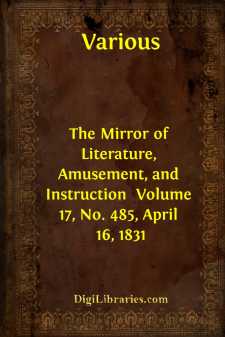Categories
- Antiques & Collectibles 13
- Architecture 36
- Art 48
- Bibles 22
- Biography & Autobiography 813
- Body, Mind & Spirit 142
- Business & Economics 28
- Children's Books 17
- Children's Fiction 14
- Computers 4
- Cooking 94
- Crafts & Hobbies 4
- Drama 346
- Education 46
- Family & Relationships 57
- Fiction 11829
- Games 19
- Gardening 17
- Health & Fitness 34
- History 1377
- House & Home 1
- Humor 147
- Juvenile Fiction 1873
- Juvenile Nonfiction 202
- Language Arts & Disciplines 88
- Law 16
- Literary Collections 686
- Literary Criticism 179
- Mathematics 13
- Medical 41
- Music 40
- Nature 179
- Non-Classifiable 1768
- Performing Arts 7
- Periodicals 1453
- Philosophy 64
- Photography 2
- Poetry 896
- Political Science 203
- Psychology 42
- Reference 154
- Religion 513
- Science 126
- Self-Help 84
- Social Science 81
- Sports & Recreation 34
- Study Aids 3
- Technology & Engineering 59
- Transportation 23
- Travel 463
- True Crime 29
The Atlantic Monthly, Volume 16, No. 96, October 1865
by: Various
Categories:
Description:
Excerpt
SAINTS WHO HAVE HAD BODIES.
All doubtless remember the story which is told of the witty Charles II. and the Royal Society: How one day the King brought to the attention of its members a most curious and inexplicable phenomenon, which he stated thus: "When you put a trout into a pail full of water, why does not the water overflow?" The savans, naturally enough, were surprised, and suggested many wise, but fruitless explanations; until at last one of their number, having no proper reverence for royalty in his heart, demanded that the experiment should actually be tried. Then, of course, it was proved that there was no phenomenon to be explained. The water overflowed fast enough. Indeed, it is chronicled that the evolutions of this lively member of the piscatory tribe were so brisk, that the difficulty was the exact opposite of what was anticipated, namely, how to keep the water in.
This story may be a pure fable, but the lesson it teaches is true and important. It illustrates forcibly the facility with which even wise men accept doubtful propositions, and then apply the whole power of their minds to explain them, and perhaps to defend them. Latterly one hears constantly of the physical decay which threatens the American people, because of their unwise and disproportioned stimulation of the brain. It is assumed, almost as an axiom, that there is "a deficiency of physical health in America." Especially is it assumed that great mental progress, either of races or of individuals, has been generally purchased at the expense of the physical frame. Indeed, it is one of the questions of the day, how the saints, that is, those devoted to literary and professional pursuits, shall obtain good and serviceable bodies; or, to widen the query, how the finest intellectual culture can exist side by side with the noblest physical development; or, to bring this question into a form that shall touch us most sharply, how our boys and girls can obtain all needful knowledge and mental discipline, and yet keep full of graceful and buoyant vitality.
What do we say to the theories and convictions which are underneath this language? What answer shall we make to these questions? What answer ought we to make? Our first reply would be, We doubt the proposition. We ask for the broad and firm basis of undoubted facts upon which it rests. And we enter an opposite plea. We affirm that the saints have as good bodies as other people, and that they always did have. We deny that they need to be patched up or watched over any more than their neighbors. They live as long and enjoy as much as the rest of mankind. They can endure as many hard buffets, and come out as tough and strong, as the veriest dolt whose intellectual bark foundered in the unsounded depths of his primer. The world's history through, the races which are best taught have the best endowment of health. Nay, in our own New England, with just such influences, physical, mental, and moral, as actually exist, there is no deterioration in real vitality to weep over.
We hold, then, on this subject very different opinions from those which prevail in many quarters. We believe in the essential healthfulness of literary culture, and in the invigorating power of sound knowledge. Emphatically do we believe that our common schools have been in the aggregate a positive physical benefit. We are confident, that, just to the degree that the unseen force within a man receives its rightful development, does vigorous life flow in every current that beats from heart to extremities. With entire respect for the opinions of others, even while we cannot concur with them, with a readiness to admit that the assertion of those opinions may have been indirectly beneficial, we wish to state the truth as it looks to us, to exhibit the facts which bear upon this subject in the shape and hue they have to our own minds, and to give the grounds of our conviction that a cultivated mind is the best friend and ally of the body.
Would it not be singular, if anything different were true? You say, and you say rightly, that the best part of a man is his mind and soul, those spiritual elements which divide him from all the rest of the creation, animate or inanimate, and make him lord and sovereign over them all. You say, and you say wisely, that the body, however strong and beautiful, is nothing,—that the senses, however keen and vigorous, are nothing,—that the outward glories, however much they may minister to sensual gratification, are nothing,—unless they all become the instruments for the upbuilding of the immortal part in man. But what a tremendous impeachment of the wisdom or power of the Creator you are bringing, if you assert that the development of this highest part, whether by its direct influence on the body, or indirectly by the habits of life which it creates, is destructive of all the rest, nay, self-destructive! You may show that every opening bud in spring, and every joint, nerve, and muscle in every animate creature, are full of proofs of wise designs accomplishing their purposes, and it shall all count for less than nothing, if you can demonstrate that the mind, in its highest, broadest development, brings anarchy into the system,—or, mark it well, produces, or tends to produce, habits of living ruinous to health, and so ruinous to true usefulness....












